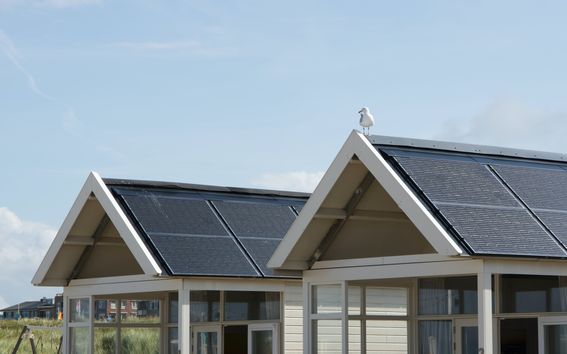Academy funding: Future energy communities and energy self-sufficiency

The energy price rally seen this winter has left many households and housing associations wondering how to cut costs. Production of energy to own use and the various energy communities that go with it could help.
A new project by Aalto University, the University of Vaasa and the Finnish Environment Institute (SYKE) is investigating energy communities: what forms they take, how new business is created to serve them, and what kind of policies and steering measures and public sector support are targeted at energy communities.
The research is based on developments in recent years that have made the production of renewable energy for own use the most affordable energy solution for many citizens. The uptake of heat pump energy and solar energy is profitable and growing strongly. Fluctuations in energy prices are also encouraging citizens to improve their energy efficiency and strive for greater energy self-sufficiency.
Digitally mediated decarbon communities in energy transition, the DigiDecarbon project, has received €2.4 million in total funding as part of the Academy of Finland's Key Areas for Green and Digital Transition programme. The Academy of Finland is funding a total of 17 consortia under the 2021 call. The selected projects will promote solutions for carbon neutrality and climate change adaptation and related digital technologies.
Energy communities increase energy efficiency
According to Sampsa Hyysalo, Professor at Aalto University, who is leading the three-year DigiDecarbon project, the research is timely for a number of reasons. Legislative changes can increase the amount of variable energy production that can be used by linking neighbourhoods to the same energy community, allowing larger and cheaper renewable energy systems to be built accordingly.
In addition, housing associations and neighbourhoods have become more active in implementing energy renovations. Peer-to-peer information facilitates the preparation, planning and decision making process. Sharing experiences and calculations among citizens brings significant savings and makes it easier to grasp a foreign and obscure subject. Digitalisation has facilitated the creation of energy communities and has created new types of communities, for example, peer-to-peer knowledge sharing has been greatly enhanced by peer-to-peer communities on the internet.
Aalto University researchers are looking at citizens' actions as energy consumers, small-scale producers and investors at the same time. 'In particular, we are studying the implementation of deep energy renovations, where citizens improve the energy efficiency of their house by adding one or more renewable energy sources, such as heat pumps or solar energy. The focus is on peer-to-peer and digitally mediated energy companies formed by citizens, whether they are small houses or housing associations,' says Hyysalo.
The University of Vaasa, on the other hand, is exploring new business models that serve energy communities. 'We are studying how new business, new business models and business ecosystems are emerging to serve energy communities. We are also interested in information services and how, for example, consulting services can help energy communities to exploit new technological opportunities,' says Jouni K. Juntunen, Associate Professor of Innovation Management at the University of Vaasa.
Jani Lukkarinen, Senior research scientist, SYKEFinland is a forerunner in the development of smart electricity systems and services."
The Finnish Environment Institute's sub-project focuses on the importance of changing policy guidance.
'There have been many changes in the regulation of energy communities in recent years, which open up new opportunities. In SYKE's work package, we are interested in exploring how these changes have affected communities and citizens and in better understanding what kind of support is needed in the future. We also aim to explore how participation in the digital energy community empowers citizens as active actors,' says Kaisa Korhonen-Kurki, Senior research scientist at the Finnish Environment Institute.
Jani Lukkarinen, Senior research scientist at SYKE, who is coordinating the project, also points out that Finland is a pioneer in the development of smart electricity systems and services. 'We are exploring how municipalities, for example, can use digital tools to help energy communities. The active use of new services by citizens also supports their export potential and the further development of policies.'
More information:
Sampsa Hyysalo, Aalto University, tel, +358505946137 e-mail sampsa.hyysalo@aalto.fi
Jouni K. Juntunen, University of Vaasa, tel. +358294498619, e-mail: jouni.juntunen@uwasa.fi
Jani Lukkarinen, SYKE, tel. +358 295 251 893, jani.lukkarinen@syke.fi
Read more news

Aalto University is introducing ORCID’s Researcher Connect service
Aalto University is introducing ORCID's Researcher Connect service, which facilitates information transfer between researchers' ORCID profiles and the university's research information management system, ACRIS.
Nature of Process: Exhibition by the students of the ‘Personal Exploration’ Course
Nature of Process is a multi-material exhibition of 14 Master´s students of Aalto ARTSEden Telila's master's thesis contributed to Ramboll's geotechnical toolkit
Geoengineering alum Eden Telila helped Ramboll automate manual tasks.






